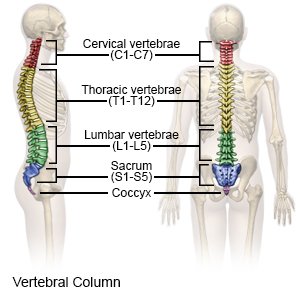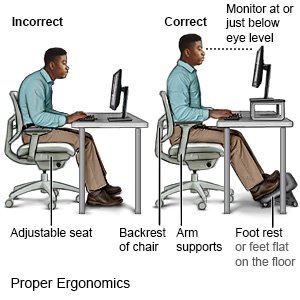Chronic Neck Pain
Medically reviewed by Drugs.com. Last updated on Aug 4, 2025.
Chronic neck pain may start to build slowly over time. Neck pain is chronic if it lasts longer than 3 months. The pain may come and go, or be worse with certain movements. The pain may be only in your neck, or it may move to your arms, back, or shoulders. You may have pain that starts in another body area and moves to your neck. You may have neck pain for years. Some types of neck pain can be permanent.
 |
DISCHARGE INSTRUCTIONS:
Call your doctor if:
- You have neck pain and shooting pain down your arms or legs.
- Your neck pain suddenly becomes severe.
- You have neck pain along with numbness, tingling, or weakness in your arms or legs.
- You have a stiff neck, a headache, and a fever.
- You have new or worsening symptoms.
- Your symptoms continue even after treatment.
- You have questions or concerns about your condition or care.
Medicines:
You may need any of the following:
- Acetaminophen decreases pain and fever. It is available without a doctor's order. Ask how much to take and how often to take it. Follow directions. Read the labels of all other medicines you are using to see if they also contain acetaminophen, or ask your doctor or pharmacist. Acetaminophen can cause liver damage if not taken correctly.
- NSAIDs , such as ibuprofen, help decrease swelling, pain, and fever. This medicine is available with or without a doctor's order. NSAIDs can cause stomach bleeding or kidney problems in certain people. If you take blood thinner medicine, always ask your healthcare provider if NSAIDs are safe for you. Always read the medicine label and follow directions.
- Prescription pain medicine called narcotics or opioids may be given for certain types of chronic pain. Ask your healthcare provider how to take this medicine safely.
- Anesthetics can be rubbed on your skin or injected into a nerve or muscle to numb an area.
- Other medicines may reduce pain, anxiety, muscle tension, or swelling.
- Take your medicine as directed. Contact your healthcare provider if you think your medicine is not helping or if you have side effects. Tell your provider if you are allergic to any medicine. Keep a list of the medicines, vitamins, and herbs you take. Include the amounts, and when and why you take them. Bring the list or the pill bottles to follow-up visits. Carry your medicine list with you in case of an emergency.
Manage or prevent chronic neck pain:
- Rest your neck as directed. Do not make sudden movements, such as turning your head quickly. Your healthcare provider may recommend you wear a cervical collar for a short time. The collar will prevent you from moving your head. This will give your neck time to heal if an injury is causing your neck pain. Ask your healthcare provider when you can return to sports or other normal daily activities.
- Apply ice for 15 to 20 minutes every hour, or as directed. Use an ice pack, or put crushed ice in a plastic bag. Cover it with a towel before you apply it to your skin. Ice decreases pain and helps prevent tissue damage.
- Apply heat for 20 to 30 minutes every 2 hours, or as directed. Heat helps decrease pain and muscle spasms.
- Do neck exercises as directed. Neck exercises help strengthen the muscles and increase range of motion. Your healthcare provider will tell you which exercises are right for you. He or she may give you instructions, or he or she may recommend that you work with a physical therapist. Your healthcare provider or therapist can make sure you are doing the exercises correctly.
- Maintain good posture. Keep your head and shoulders lifted when you sit. If you work in front of a computer, put the monitor at eye level. You should not need to look up or down to see the screen. You should also not have to lean forward to read what is on the screen. Keep your keyboard, mouse, and other computer items where you do not have to reach for them. Get up often if you work in front of a computer or sit for long periods of time. Stretch or walk around to keep your neck muscles loose.

- Ask about acupuncture for pain relief. Neck pain is sometimes relieved with acupuncture. Talk to your healthcare provider before you get this treatment to make sure it is safe for you.
Follow up with your healthcare provider as directed:
Your healthcare provider may refer you to a specialist if your pain does not get better with treatment. Write down your questions so you remember to ask them during your visits.
© Copyright Merative 2025 Information is for End User's use only and may not be sold, redistributed or otherwise used for commercial purposes.
The above information is an educational aid only. It is not intended as medical advice for individual conditions or treatments. Talk to your doctor, nurse or pharmacist before following any medical regimen to see if it is safe and effective for you.
Learn more about Chronic Neck Pain
Care guides
Further information
Always consult your healthcare provider to ensure the information displayed on this page applies to your personal circumstances.
